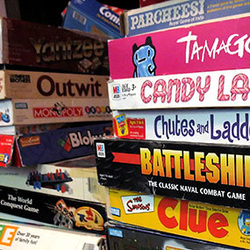Board Games and Table Top Gaming
Board games have been accepted as part of the library experience long before video games and Internet games started creeping onto the scene. Over 90% of libraries supporting game programming use board games and table top gaming to do it! Board games are also familiar family entertainment that can appeal to patrons of all ages.
Research
When Scott Nicholson took the "pulse" of games' programs in libraries in 2007, "out of 172 libraries that [ran] formal programs, about half of them said they use 'board games' in those programs." Such games were also the most likely to be circulated to library patrons.
Scholastic's Parent and Child Magazine looks at the benefits of board games in the article "The Benefits of Board Games." Board games teach cooperative play, new skill mastery, and ethical behavior. This is especially true for children playing games.
In his article, "Meet the New School Board," Christopher Harris looks at newer board games that not only encourage players to strategize and recall information, but also to think critically. Games, such as Pandemic, are wonderful vehicles to teach young people higher thinking processes.
Scholastic's Parent and Child Magazine looks at the benefits of board games in the article "The Benefits of Board Games." Board games teach cooperative play, new skill mastery, and ethical behavior. This is especially true for children playing games.
In his article, "Meet the New School Board," Christopher Harris looks at newer board games that not only encourage players to strategize and recall information, but also to think critically. Games, such as Pandemic, are wonderful vehicles to teach young people higher thinking processes.
Successful Programs
- Kellog-Hubbard Library in Montpelier, VT: This library held a ten week long Ace of Games Tournament in 2009. They had a number of sessions depending on the age of the participants. Ages 6-12 met on Friday afternoons from 3-5 pm. Participants aged 10 and up could attend Saturday sessions from 2-5 pm. Games included in the program were Carcassone, Blokus, Dungeons & Dragons, Memoir '44, and others. The program was viewed as successful.
- The Public Library of Charlotte-Mecklenburg County, Cornelius Branch: A Monopoly tournament was held to provide socialization and positive activities for families during the week of spring break. In addition to four Monopoly games, the library provided Jenga, Trouble, and other such games for younger children and eliminated Monopoly players. Monopoly players were divided into groups. Each group played the game for one hour. At the end of the allotted time, the players with the most money advanced to the next round until a winner was declared.
Advice
- The games must be authentic. An authentic game is fun as well as educational. If you would want to play this game in your free time, it would probably be a good addition to your collection.
- The games must be in agreement with your collection policy. This will help you in explaining your game choices to patrons and superiors.
- Take advantage of the tools available to you. There are a number of sources available that evaluate board games, making it that much easier to choose the right games for your collection. Some good resources are www.boardgamegeek.com, www.gamesforeducators.com, and www.boardgameswithscott.com.
Page edited by Monica Crane

